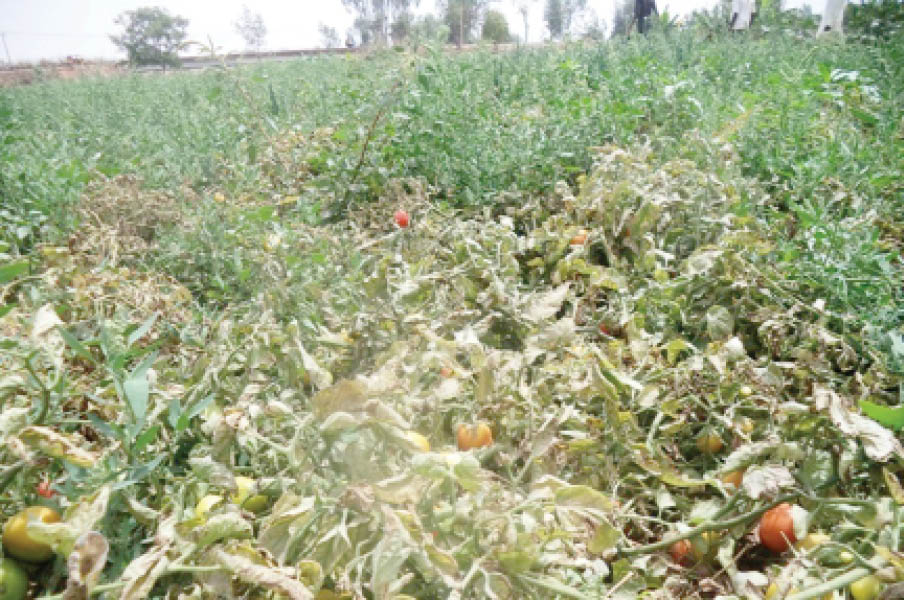‘Ebola’ threatens tomato farms in Katsina
Tutaabsoluta, a dreaded tomato pest, widely known as ‘tomato ebola,’ is posing a serious threat to irrigation farmers in Katsina State. The season has witnessed mass cultivation of tomato, courtesy of its high market price and demand across the country. However, many of the producers failed to take measures as early as possible because they […]

A Tomato farm attacked by Tuta Absoluta at Mairuwa, Katsina State
Tutaabsoluta, a dreaded tomato pest, widely known as ‘tomato ebola,’ is posing a serious threat to irrigation farmers in Katsina State.
The season has witnessed mass cultivation of tomato, courtesy of its high market price and demand across the country.
However, many of the producers failed to take measures as early as possible because they had little or no experience of the pest in the past.
According to the farmers, only an experienced irrigation farmer can adequately tackle tutaabsoluta, considering its persistence and rapid damage on tomato plant and its fruits.
Mansur Usman, a tomato farmer and dealer in Funtua, said that for quite some years they had mitigated the potency of the pest on the crop using strong pesticides such as Coragen.
“We first discovered ‘tomato ebola’ sometime in 2015 when many of us lost millions of naira to it. But with the discovery of pesticides such as Ampligo, Coragen and Tihan, we were able to reduce the effect of the pest to the barest minimum until this year when new comers invested in the cultivation of the crop without prior knowledge of the dreaded pest,’’ Usman said.
He added that the pest multiplies fast and has a devastating effect on tomato farms from March to June, but it stays earlier on the crop, sometimes right from the nursery stage, breeding its eggs on the back of the leaves and stems.
Usman further said a farmer should not wait until the pest attacks before taking measures against it.
“To tackle tutaabsoluta, one needs to start right from the nursery stage by clearing and burning the rubbish on the farm, as well as periodic application of Tihan or Coragen pesticides on the plants,’’ he advised.
Another farmer, Isah Umar Mairuwa, said as far as the farmer realised the existence of the pest early enough and took appropriate measures, it would not have a devastating effect on the farm.
“Since we discovered Tihan chemical we are no longer in fear of tomato ebola. The fact is that we have not cured it entirely, but at least with the application of the chemicals regularly, we are decimating its impact on the crop. Those who are new into tomato production should not rest on their oars in seeking information and technical know-how from experienced farmers to tackle the pest,’’ he advised.
Alhaji Adamu Funtua, a farmer and dealer in pesticides, said Coragen and Tihan were the most effective chemicals against tutaabsoluta.
“Coragen is now scarce in the market because we were sourcing it from Cameroon. Some marketers have started adulterating it here in Nigeria, that is why farmers abandoned it and concentrated on Tihan. It has a consistent and lasting control on key pests on over 100 vegetable crops against broad spectrum of lepidopteran pests,’’ the farmer said.
Funtua added that Tihan OD 175 is mainly for the control of Lepidoptera, known as tutaabsoluta, aphids and thrips in tomatoes and other crops. He decried that despite the discovery of the disease in Nigeria over five years ago, government at all levels are yet to provide a lasting solution to it.
